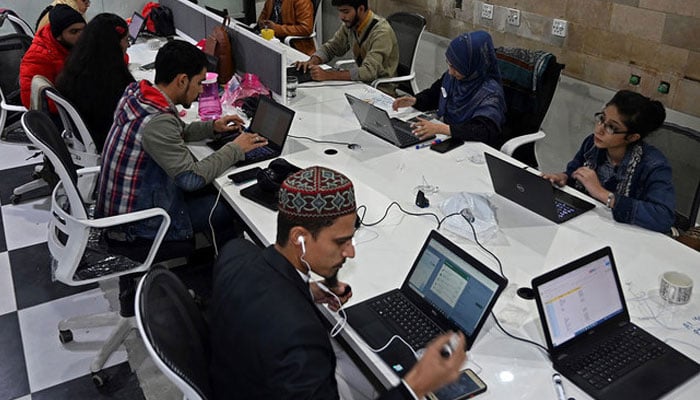Tech experts see digital accessas a basic human right for all
KARACHI: Digital literacy and digital access should be seen as a fundamental human right for all, experts say.
Tabadlab, an advisory services firm and think tank, organized its 64th policy roundtable on Monday (May 27) in Islamabad. It held a panel titled ‘Digital Gender Inclusion Strategy: Business as Usual’, to discuss the Digital Gender Inclusion Strategy launched by the Pakistan Telecommunications Authority (PTA) last month.
During the discussion CEO and Founder of tech-organization CIRCLE Women Association Sadaffe Abid said that access to the internet in today’s world is a basic fundamental human right.She added that if the country did not invest in digital inclusion, women and girls herewould be left behind.
The panel was moderated by Tabadlab’s Director of Centre for Gender and Public Health Samia
Liaquat and included other industry experts: Co-founder and General Partner at i2i Ventures Kalsoom Lakhani; CEO and Co-founder Oraan Halima Iqbal; and COO Mobilink Microfinance Bank Haaris Mahmood Chaudhary.
The PTA’s latest report examines the gender digital divide and increased gender participation in digital transformation. It adds that some of the critical challenges facing women are: lack of education, limited access to mobile phones, family disapprovals, high costs of buying phones, and safety and security concerns.
The report further highlights the concern by a large majority of people that the internet is not relevant for women. Tabadlab held the discussion to dig deeper and explore the steps that authorities can take to improve the situation, with the help of a panel of experts.
Lakhani highlighted the structural challenges hindering women from changing their lifestyles. She said, “policies often give consideration to outputs over outcomes, leading to reduced effectiveness.”
Iqbal stressed the importance of involving decision-makers within households to influence behaviour positively and drive meaningful change: “By engaging families, we can create a supportive environment for digital literacy and inclusion.”
Chaudhary pointed out that Pakistan faces obstacles such as low average revenue per user (ARPU) and high taxes. “These factors deter telecom giants from investing in critical infrastructure. Similarly, heavy taxation on phones also does not provide a conducive environment for investors with regard to taking initiatives.”
Abid said that it was imperative to provide recommendations to strengthen the PTA’s strategy, and that there should be a focus on digital literacy through steps which can reach women so they can also have access to the internet.
For Chaudhary, an enabling environment for public-private partnerships is key to bridge the digital gap so that telcos and the government can work together without inhibition.Lakhani felt that there should be a deeper study which can only happen by asking the right questions and understanding the landscape.Per Iqbal, the strategy should be approached with a “holistic perspective” especially to look for any contradictory policies which may lead to women’s exclusion as opposed to their inclusion.
-
 Princess Beatrice, Eugenie Are ‘not Innocent’ In Epstein Drama
Princess Beatrice, Eugenie Are ‘not Innocent’ In Epstein Drama -
 Reese Witherspoon Goes 'boss' Mode On 'Legally Blonde' Prequel
Reese Witherspoon Goes 'boss' Mode On 'Legally Blonde' Prequel -
 Chris Hemsworth And Elsa Pataky Open Up About Raising Their Three Children In Australia
Chris Hemsworth And Elsa Pataky Open Up About Raising Their Three Children In Australia -
 Record Set Straight On King Charles’ Reason For Financially Supporting Andrew And Not Harry
Record Set Straight On King Charles’ Reason For Financially Supporting Andrew And Not Harry -
 Michael Douglas Breaks Silence On Jack Nicholson's Constant Teasing
Michael Douglas Breaks Silence On Jack Nicholson's Constant Teasing -
 How Prince Edward Was ‘bullied’ By Brother Andrew Mountbatten Windsor
How Prince Edward Was ‘bullied’ By Brother Andrew Mountbatten Windsor -
 'Kryptonite' Singer Brad Arnold Loses Battle With Cancer
'Kryptonite' Singer Brad Arnold Loses Battle With Cancer -
 Gabourey Sidibe Gets Candid About Balancing Motherhood And Career
Gabourey Sidibe Gets Candid About Balancing Motherhood And Career -
 Katherine Schwarzenegger Shares Sweet Detail From Early Romance Days With Chris Pratt
Katherine Schwarzenegger Shares Sweet Detail From Early Romance Days With Chris Pratt -
 Jennifer Hudson Gets Candid About Kelly Clarkson Calling It Day From Her Show
Jennifer Hudson Gets Candid About Kelly Clarkson Calling It Day From Her Show -
 Princess Diana, Sarah Ferguson Intense Rivalry Laid Bare
Princess Diana, Sarah Ferguson Intense Rivalry Laid Bare -
 Shamed Andrew Was With Jeffrey Epstein Night Of Virginia Giuffre Assault
Shamed Andrew Was With Jeffrey Epstein Night Of Virginia Giuffre Assault -
 Shamed Andrew’s Finances Predicted As King ‘will Not Leave Him Alone’
Shamed Andrew’s Finances Predicted As King ‘will Not Leave Him Alone’ -
 Expert Reveals Sarah Ferguson’s Tendencies After Reckless Behavior Over Eugenie ‘comes Home To Roost’
Expert Reveals Sarah Ferguson’s Tendencies After Reckless Behavior Over Eugenie ‘comes Home To Roost’ -
 Bad Bunny Faces Major Rumour About Personal Life Ahead Of Super Bowl Performance
Bad Bunny Faces Major Rumour About Personal Life Ahead Of Super Bowl Performance -
 Sarah Ferguson’s Links To Jeffrey Epstein Get More Entangled As Expert Talks Of A Testimony Call
Sarah Ferguson’s Links To Jeffrey Epstein Get More Entangled As Expert Talks Of A Testimony Call




